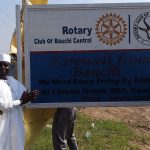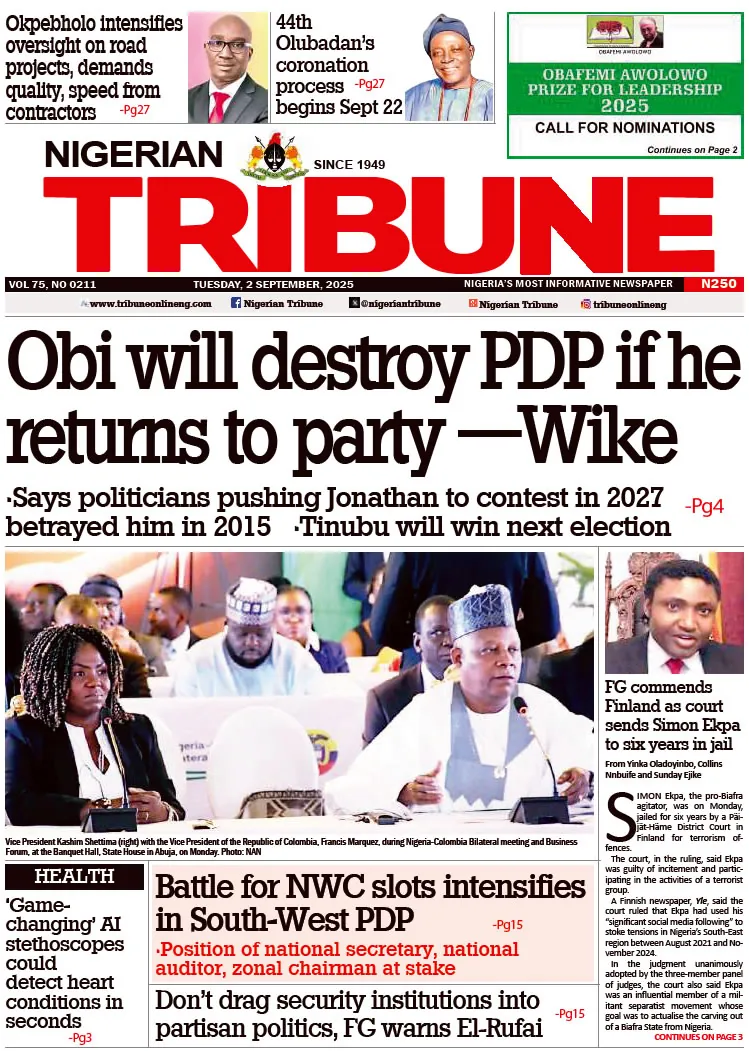Executive Secretary of Universal Basic Education Commission (UBEC), Hajiya Aisha Garba, shares her life story with SEGUN KASALI and the drive behind her work.
Did you ever think of being where you are today, growing up?
After I graduated, I came back to Nigeria to start my first job with a health-focused NGO in areas of maternal health and immunisation for children in Zamfara State. I went to Zamfara because the work involved working with extreme rural communities. I used to go to those communities, and sometimes, sleep in the bush; there was no toilet, no security. It was very scary. My family and everyone were really concerned. They asked why I was doing that and what was driving me. They could not really understand. To be really honest, for me, when I came back to Nigeria, I felt that our people are really in need of help. I feel bad when I go out and see people pushing water in cartwheels. I see the hunger and I see the way they beg. For me, it was something that really touched me. So, to answer your question, it was always at the back of my mind that “God, I really need to do something that will help our people.” So, that has always been my drive. The level of poverty in those areas, the lack of awareness in terms of maternal health, and the lack of education in those areas were the challenges I saw. You will see young mothers with no idea of how to take care of babies, even less of immunisation or feeding. So, I saw everything at that level. And, for me, the main takeaway is that the development that is needed in Nigeria must start from those areas. I have seen urban Nigeria, but I have seen poverty more from the rural areas. Interestingly, Nigeria is 70 percent of rural areas, while urban Nigeria is only 30 percent. Imagine seeing 60 to 70 percent of the extreme poor not having the proper knowledge; no education, high poverty and mortality rates and child malnutrition. That should be enough to make one think of how to get involved.
What were those memories that lingered in your mind while working and staying in those bushes?
One of such is the fact that I was always scared to sleep at night. You would hear all sorts of noise from animals, I swear. Also, there was no toilet. Sometimes I was there with these expatriates from Doctors Without Borders/Médecins Sans Frontières (MSF), and they really went to the extreme parts of the areas. So, we worked together and I was representing PRRINN-MNCH, which was a UK aid at a time, but currently Foreign, Commonwealth & Development Office (FCDO). So, MSF was also a partnership project. So, those were scary moments for me.
Any event in retrospect?
Yes, but I don’t even want to remember it. It had to do with some of the people we worked with, because the main activity when we were in those rural areas was for us to sit with those mothers and tell them “This is how you should take care of your child and yourself,” because most of the mothers were very young, between 13 and 14 years old. And about two of them were always looking up to me. So, one of them lost her life during childbirth. It was quiet sad. It was something I couldn’t forget when we were still in that rural area. Apart from not knowing how to take care of themselves, the other challenge was lack of health facility in the area. Pregnant women had to go long distances before getting to the nearest primary healthcare centre for delivery and there were no cars. And in this particular case, they used a motorcycle to take her to the hospital. She died before they got to the hospital. So, for me, that was really sad. It is something I cannot forget in a hurry.
How did your parents react to your “bush” experience?
They could not understand me. What was the drive? The funny part is I came from a family of nine, but I was the first one that ever worked. Believe me, they could not even understand somebody working, even less of going to the bush, spending days and coming back home and going back to that bush again, all in the name of working. So, they knew it was not about the money, but they could not understand my drive to be honest. So, it was only when my career started progressing that some of my siblings also started working, because they saw me working. That also influenced my sister, who is about to become a judge now. She joined public sector to start working because she got tired of seeing me early morning, going out. So, she decided to get a job. For me, the most important thing is that I became an inspiration. Initially, they could not understand my drive. They were looking at me weirdly. I am the middle child. Later on, they all tried to do something.
Does being an inspiration mean that you’ve been this brilliant from childhood?
I don’t think so. I would say I have been compassionate. I hear that all the time that ‘Oh, she has a soft heart and is quiet’. So, it is not because of brilliance. I don’t think anyone cannot do what I do to be honest. For me, it is the drive. What drives me even today at UBEC is the solution to help address the problem of basic education in Nigeria. This has been my drive wherever I find myself and the same thing happened when I was with the World Bank. At the bank, I ended up leading the bank’s largest education project globally and to be honest it was always because of my drive. I don’t just see it as this is something to gain; meanwhile, it is how to use my position to leave impact on the ground. So, that is what keeps me awake every time since I joined UBEC. Every time I wake up, it is not about the politics or money, but about how God has put me in this position for a purpose. And it is important to give credit where it is due. The president is really committed to education. Otherwise, he would not pick me because I am not a politician but he knows that I have something to contribute. The Minister of Education, Tunji Alausa, is someone with similar background; his own passion is also to make a difference. In Nigeria, he is not here because of politics. For the two of them to really stand their ground, despite the political pressure to say I am the right person to be here, it is something commendable. They reached out and I agreed because it is a national service. For me, the main reason why I joined is because I feel if I want to contribute to Nigeria’s development. There is no better way to do it than to be inside. At the World Bank, you give financing to the government, and then government uses that particular funding with some guidance from us and supervision. But, with this, I will be the one implementing such a project. So, there is no better time than now when you have the president leading the Renewed Hope Agenda in terms of education, and with the right minister to support that vision. I just told myself “let us use the commitment from leadership to see what you can do.” So, every time I wake up, my main focus is really how do I address the issue of basic education. I said it yesterday that the statistics is not looking good for Nigeria. What we have in Nigeria is high number of out-of-school children, and even those that are in school dropout.
What would you have studied in the university, alternatively?
That would have been Medicine because I wanted to become a doctor. I remember I was very good in Biology. I always took the first position in anything Biology. I really thought I would be a doctor. I had two childhood friends from my primary school that we all aspired to become doctors and they became doctors. They studied in Nigeria; one is optometrist, while the other is a general practitioner. I was the only one that went a different way.
Any regret?
No.
What were the traits you took from your parents?
My mum was very nice to people and everybody. For some reasons, she attracts people and she is welcoming. For us, we grew up very reserved. But for some reasons, she is the opposite. So, I try to be more open because I know it is a good trait. I lost my dad when I was 15 years old. So, she has always been there solidly behind us and she is somebody you can depend on. Whenever we have a problem, we go to her. She brought the nine of us up because our dad died early. So, I took my strength from her. My Dad was very kind, gentle and compassionate. He never beat us.
Who was the disciplinarian then?
My dad never beat us. I was only “terrorised” by my brothers because I have six brothers. My dad always protected us. So, it was more from my brothers, not from my dad.
READ ALSO: Nigerians laud UBEC’s Aisha Garba for HOPE-EDU programme, express optimism for education reform
WATCH TOP VIDEOS FROM NIGERIAN TRIBUNE TV
- Let’s Talk About SELF-AWARENESS
- Is Your Confidence Mistaken for Pride? Let’s talk about it
- Is Etiquette About Perfection…Or Just Not Being Rude?
- Top Psychologist Reveal 3 Signs You’re Struggling With Imposter Syndrome
- Do You Pick Up Work-Related Calls at Midnight or Never? Let’s Talk About Boundaries







